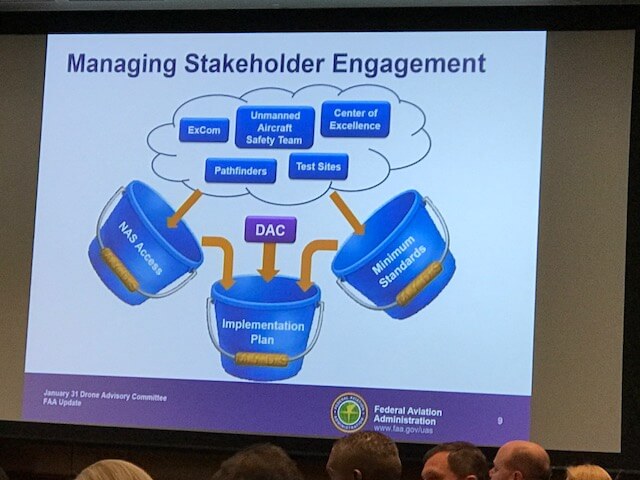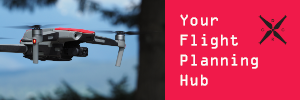- Joined
- Nov 3, 2016
- Messages
- 37
- Reaction score
- 5
- Age
- 63
Interesting questions by Patrick Egan over at suasnews.com here: The FAA Private Rule Making Process - sUAS News - The Business of Drones
and I have pasted the article below:
-----------------------------------------------
The FAA Private Rule Making Process
By
Patrick Egan
-
8 November 2017

If you have been paying attention and have invested the time into listening to the podcasts, presentations, and videos or read the stories, you’ve probably either said or thought that this Egan guy is confused. You’re correct, I am confused. Confused about why we would need a FACA screen and a public rulemaking process that lacks openness and transparency.
The Federal Advisory Committee Act (FACA) Brochure
Lately, we’re finding that indeed there is a private FAA rulemaking process. The Washington Post story confirms much of what I’ve been saying, which is less of a conspiracy theory and more of a stacked deck. It didn’t just start with the DAC; this appears to be a systematic or institutional game plan that favours a group of stakeholders over the public.
Many forget that I’ve been working the regulatory wheel of suffering now for going on 14 years, and not as a party planner or coattail rider, but as an operator and businessperson. What we read in the Washington Post article is just another example of business as FAA rule-making usual. The RTCA, an organization with a long and distinguished aviation standards history, stumbles on drones again. One of the spokes on said regulatory wheel of suffering is the RCTA and I was there for the start of SC 203.
What a mess that turned out to be. Long story short they made the Airline Pilots Association (ALPA) rep the chair for the sUAS subcommittee without even mentioning it to affected stakeholders. The handwriting was hard to miss that this was a do as you will process with apparent little regard for optics. With what was in the recent WaPo article we can see that it is more of a rule-making tradition than a one-off exception.
Vindications do not come as victories, but usually as a sad reminder for those without the money or lobbying horsepower to have a voice in the representative system. Folks have asked me if I wrote the WaPo story. I did not. Yes, I shared some emails, and I will say it is safe assume that at least a few people out there are reading my articles.
I sent letters off to both the FAA counsel and RTCA president asking for clarification on confidentiality about the DAC and Federal Advisory Committee Act (FACA). I am not an expert on what constitutes mal or misfeasance, but I will say that the answers do not instill much confidence in the safeguarding of the public trust.
In layman’s terms, this is how it shakes out; Private groups like the RTCA can run a FACA for the Federal Government. If it is decided that a subject needs special attention they can stand up a subcommittee or “Task Group” and install an industry co-chair to work in private. The confidentiality is supposedly only in place till a consensus is reached. No minutes are required, no reporting to federal representatives or government oversight required. It appears as though it affords the committee a way to eliminate the encumbrances or tenets of government in the sunshine; openness, transparency and or efficiency. The efficiency part is in the eye of the stakeholder and if one doesn’t like what they see they just change or massage perspective to fit.
In this case someone as yet to be determined decided that confidentiality agreements were necessary to keep the work of Task Group 1, led by industry co-chair Brendan Schulman, secret. Who came up with the confidentiality agreement plan and who authorized it? I asked FAA counsel for the name of the federal official who authorized the confidentiality agreements.
Dear Mr. Egan:
The FAA did not request or suggest the use of a non-disclosure agreement (NDA) for Task Group 1, a task group created under the DAC, referenced in the article you shared. You ask whether NDAs are referenced in the “FACA Manual.” As previously indicated, the Office of Rulemaking Committee Manual (ORCM) you previously referenced as the “FACA manual,” is not applicable to Drone Advisory Sub-committee (DAC), or any of the working groups or task groups that report to it. It likewise is not applicable to the RTCA, which is the parent advisory committee subject to FACA under which the DAC falls. The ORCM is applicable to the Aviation Rulemaking Committee (ARC) and the Aviation Rulemaking Advisory Committee (ARAC), another advisory committee subject to FACA. Setting aside its inapplicability, the ORCM does not identify the use of NDA by working or task groups that fall under the ARAC or its subcommittee, nor does it prohibit the use of NDAs.
Pat McNall
Okay, fair enough. Still waiting on the answers (not the FAA boilerplate) from RTCA President, Margaret Jenny. Was it a registered lobbyist from a Chinese company or the RTCA that decided the deliberations and desired outcomes were too important to share with the end-user or American public. As we learned in the WaPo article, some felt as though it could limit their ability to participate effectively.
At face value, you may think that this is all just too weird, but let me assure you that a tool that is employed is marginalizing the critic with a threat of being kicked off the committee. We’re working on a consensus, and if you don’t get with the program, we label you a leaker (even if your constituency is nearly a million people) and boot you off the Task Group, committee or whatever we have to do to get the square peg through the round hole.
Before you go rushing off with the notion that this is an egregious claim I will give you a historical example for reference. Another spoke in the regulatory wheel of suffering was the sUAS ARC were the tactic was employed to get rid of Fred Marks, FMA Direct, for divulging details to his constituency at the American Farm Bureau. That situation was a little different as there was direct federal oversight and they could not produce any legal language that supported such secrecy claims and ramifications, and Fred Marks was allowed to stay.
Why does this all matter to me? Well, many folks don’t understand why I even care or what my angle is with airspace integration. It’s simple; all I have ever wanted was this technology to be open and available to as many people as possible; so folks could build businesses, create jobs and innovate in ways that would help us better manage our world.
and I have pasted the article below:
-----------------------------------------------
The FAA Private Rule Making Process
By
Patrick Egan
-
8 November 2017

If you have been paying attention and have invested the time into listening to the podcasts, presentations, and videos or read the stories, you’ve probably either said or thought that this Egan guy is confused. You’re correct, I am confused. Confused about why we would need a FACA screen and a public rulemaking process that lacks openness and transparency.
The Federal Advisory Committee Act (FACA) Brochure
Lately, we’re finding that indeed there is a private FAA rulemaking process. The Washington Post story confirms much of what I’ve been saying, which is less of a conspiracy theory and more of a stacked deck. It didn’t just start with the DAC; this appears to be a systematic or institutional game plan that favours a group of stakeholders over the public.
Many forget that I’ve been working the regulatory wheel of suffering now for going on 14 years, and not as a party planner or coattail rider, but as an operator and businessperson. What we read in the Washington Post article is just another example of business as FAA rule-making usual. The RTCA, an organization with a long and distinguished aviation standards history, stumbles on drones again. One of the spokes on said regulatory wheel of suffering is the RCTA and I was there for the start of SC 203.
What a mess that turned out to be. Long story short they made the Airline Pilots Association (ALPA) rep the chair for the sUAS subcommittee without even mentioning it to affected stakeholders. The handwriting was hard to miss that this was a do as you will process with apparent little regard for optics. With what was in the recent WaPo article we can see that it is more of a rule-making tradition than a one-off exception.
Vindications do not come as victories, but usually as a sad reminder for those without the money or lobbying horsepower to have a voice in the representative system. Folks have asked me if I wrote the WaPo story. I did not. Yes, I shared some emails, and I will say it is safe assume that at least a few people out there are reading my articles.
I sent letters off to both the FAA counsel and RTCA president asking for clarification on confidentiality about the DAC and Federal Advisory Committee Act (FACA). I am not an expert on what constitutes mal or misfeasance, but I will say that the answers do not instill much confidence in the safeguarding of the public trust.
In layman’s terms, this is how it shakes out; Private groups like the RTCA can run a FACA for the Federal Government. If it is decided that a subject needs special attention they can stand up a subcommittee or “Task Group” and install an industry co-chair to work in private. The confidentiality is supposedly only in place till a consensus is reached. No minutes are required, no reporting to federal representatives or government oversight required. It appears as though it affords the committee a way to eliminate the encumbrances or tenets of government in the sunshine; openness, transparency and or efficiency. The efficiency part is in the eye of the stakeholder and if one doesn’t like what they see they just change or massage perspective to fit.
In this case someone as yet to be determined decided that confidentiality agreements were necessary to keep the work of Task Group 1, led by industry co-chair Brendan Schulman, secret. Who came up with the confidentiality agreement plan and who authorized it? I asked FAA counsel for the name of the federal official who authorized the confidentiality agreements.
Dear Mr. Egan:
The FAA did not request or suggest the use of a non-disclosure agreement (NDA) for Task Group 1, a task group created under the DAC, referenced in the article you shared. You ask whether NDAs are referenced in the “FACA Manual.” As previously indicated, the Office of Rulemaking Committee Manual (ORCM) you previously referenced as the “FACA manual,” is not applicable to Drone Advisory Sub-committee (DAC), or any of the working groups or task groups that report to it. It likewise is not applicable to the RTCA, which is the parent advisory committee subject to FACA under which the DAC falls. The ORCM is applicable to the Aviation Rulemaking Committee (ARC) and the Aviation Rulemaking Advisory Committee (ARAC), another advisory committee subject to FACA. Setting aside its inapplicability, the ORCM does not identify the use of NDA by working or task groups that fall under the ARAC or its subcommittee, nor does it prohibit the use of NDAs.
Pat McNall
Okay, fair enough. Still waiting on the answers (not the FAA boilerplate) from RTCA President, Margaret Jenny. Was it a registered lobbyist from a Chinese company or the RTCA that decided the deliberations and desired outcomes were too important to share with the end-user or American public. As we learned in the WaPo article, some felt as though it could limit their ability to participate effectively.
At face value, you may think that this is all just too weird, but let me assure you that a tool that is employed is marginalizing the critic with a threat of being kicked off the committee. We’re working on a consensus, and if you don’t get with the program, we label you a leaker (even if your constituency is nearly a million people) and boot you off the Task Group, committee or whatever we have to do to get the square peg through the round hole.
Before you go rushing off with the notion that this is an egregious claim I will give you a historical example for reference. Another spoke in the regulatory wheel of suffering was the sUAS ARC were the tactic was employed to get rid of Fred Marks, FMA Direct, for divulging details to his constituency at the American Farm Bureau. That situation was a little different as there was direct federal oversight and they could not produce any legal language that supported such secrecy claims and ramifications, and Fred Marks was allowed to stay.
Why does this all matter to me? Well, many folks don’t understand why I even care or what my angle is with airspace integration. It’s simple; all I have ever wanted was this technology to be open and available to as many people as possible; so folks could build businesses, create jobs and innovate in ways that would help us better manage our world.







